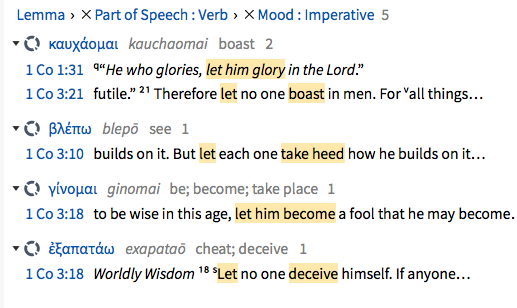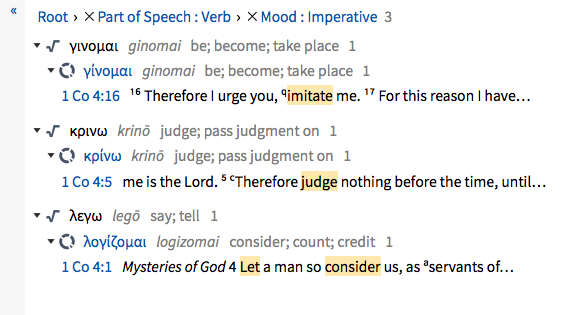The IMPERATIVE ‘mood’ is one of four ‘leanings’ or intended effects in the Koine Greek. Just below is a general description from Wikipedia (10/18/17):
Imperative
(Greek: προστακτική prostaktikḗ “for commanding”, from προστάσσω prostássō “I command”).
The present imperative is used for general commands:[103]
- τοὺς μὲν θεοὺς φοβοῦ, τοὺς δὲ γονεῖς τῑ́μᾱ.[104]
- toùs mèn theoùs phoboû, toùs dè goneîs tī́mā.
- Fear the gods, and honour your parents.
The aorist imperative is used when the speaker wishes something done at once:
- δότε μοι ξίφος ὅπως τάχιστα.[105]
- dóte moi ksíphos hópōs tákhista.
- Give me a sword as quickly as possible!
It is also possible in Greek to have a 3rd person imperative, as in the following examples:
- ἀπαγέτω τις αὐτὴν οἴκαδε.[106]
- apagétō tis autḕn oíkade
- Someone take her away home (at once).
- θεοὶ ἡμῖν μάρτυρες ἔστων.[107]
- theoì hēmîn mártures éstōn.
- The gods be witnesses for us.
The imperative mood can also be used in the perfect tense, as the following example shows:
- κέντρῳ τῷ Α, διαστήματι τῷ ΑΒ, γεγράφθω κύκλος.[108]
- kéntrōi tōî A, diastḗmati tōî AB, gegráphthō kúklos
- Let a circle have been drawn with centre A, radius AB.

